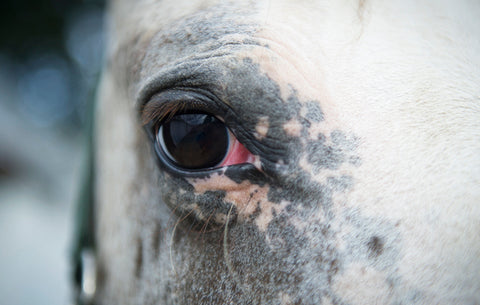Your basket is empty

The symptoms of uveitis vary according to the intensity of the inflammatory crisis, its stage of evolution and its location in the eye. In most cases, however, the main symptom of uveitis is pain manifested by the horse's closed eye, which is highly sensitive to light.
This disease, which can affect horses with no clinical signs or sometimes just a fever, is an infection caused by bacteria. With each successive attack, hence the name "recurrent uveitis", a definitive change in iris color is observed, as well as more or less diffuse cataracts, deformed pupils and changes in the size of the eyeball. It should be noted that with each new attack of uveitis, in addition to the pain, the inflammation worsens the condition of the animal's eye, leading to numerous after-effects. Lyme disease is also often the cause of recurrent equine uveitis.
Uveitis is a worrying disease that should not be taken lightly. Apart from the loss or reduction of vision, it is often the management of pain that becomes complicated over the long term, and can be a real nightmare for the owner. Some horses are genetically predisposed, notably Appaloosas. Age is not a discriminating factor. Most of the time, the horse will receive only symptomatic treatment, based on eye drops, to relieve pain, reduce inflammation and try to limit after-effects. As far as possible, the horse should remain in the dark or away from light. Whether your horse is the victim of an isolated attack or a recurrence, our products have been designed to help you manage this problem and protect your horse's eyes as effectively as possible. They enable your horse to continue living normally, both at work and at rest, while being protected from the elements and light. Their field of vision is preserved. If in doubt, consult your veterinarian. The earlier you intervene, the less difficult the crisis will be to manage.
> Also read : Medicinal and surgical treatment of uveitis in horsesAll measurements are approximate and for guidance only.

| Mask size | Head circumference |
| XS - Shetland | 84 cm |
| S - Pony | 90 cm |
| M - Cob | 94 cm |
| L - Full | 100 cm |
| XL - XFull | 110 cm |
For these masks, the main measurement is that of your horse's forehead. To do this, add up 3 measurements:
Add these 3 measurements (A+B+C) to obtain the size of your horse's forehead.
IMPORTANT: do not measure directly from one eye to the other, as this will probably result in a measurement that is too small.

| Mask size | Forehead size |
| XS - Shetland | 18-21 cm |
| S - Pony | 22-28 cm |
| M - Cob | 29-33 cm |
| L - Full | 34-37 cm |
| XL - XFull | 38-43 cm |

| Size | A | B | C |
| XS (large shetland) | 60 cm | 84 cm | 20 cm |
| S (pony) | 70 cm | 96 cm | 23 cm |
| M (cob) | 70 cm | 96 cm | 25.5 cm |
| L (full) | 75 cm | 105 cm | 27 cm |
If your horse is between two sizes, we advise you to take the smaller size.
| Mask size | Distance between eyes |
| S - Pony | 18 cm |
| M - Cob | 21 cm |
| L - Full | 24 cm |
| XL - XFull | 26 cm |

Are you mistaken? An exchange is always possible, and we'll do it as quickly as possible, as long as you return the item, undamaged, within 14 days.
> See return conditions